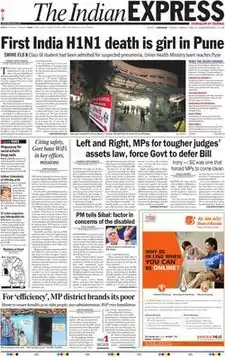The Indian Express
The Indian Express is an English-language Indian daily newspaper. It is published in Mumbai by Indian Express Group. In 1999, eight years after the group's founder Ramnath Goenka's death in 1991,[3] the group was split between the family members. The southern editions took the name The New Indian Express, while the northern editions, based in Mumbai, retained the original Indian Express name with "The" prefixed to the title.[4]
 = =The publication's 4 August 2009 front page | |
| Type | Daily newspaper |
|---|---|
| Format | Broadsheet |
| Owner(s) | Indian Express Group |
| Publisher | Indian Express Group |
| Editor-in-chief | Raj Kamal Jha[1][2] |
| Founded | 1932 |
| Language | English |
| Headquarters | B1/B, Express Building, Sector 10, Noida, Uttar Pradesh, India |
| Sister newspapers | The Financial Express Loksatta Jansatta |
| ISSN | 769115202 |
| OCLC number | 70274541 |
| Website | www.indianexpress.com |
History
In 1932, the Indian Express was started by an Ayurvedic doctor, P. Varadarajulu Naidu, at Chennai, being published by his "Tamil Nadu" press. Soon under financial difficulties, he sold the newspaper to Swaminathan Sadanand, the founder of The Free Press Journal, a national news agency. In 1933, the Indian Express opened its second office in Madurai, launching the Tamil edition, Dinamani. Sadanand introduced several innovations and reduced the price of the newspaper. Faced with financial difficulties, he sold a part of his stake to Ramanath Goenka as convertible debentures. In 1935, when The Free Press Journal finally collapsed, and after a protracted court battle with Goenka, Sadanand lost ownership of Indian Express.[5] In 1939 Goenka bought Andhra Prabha, another prominent Telugu daily newspaper. The name Three Musketeers was often used for the three dailies namely, Indian Express, Dinamani and Andhra Prabha.
In 1940 the whole premises was gutted by fire. The Hindu, a rival newspaper, helped considerably in re-launching the paper, by getting it printed temporarily at one of its Swadesimithran's press and later offering its recently vacated premises at 2, Mount Road, on rent to Goenka, which later became the landmark Express Estates.[6] This relocation also helped the Express obtain better high speed printing machines. The district judge who did inquiry into the fire concluded that a short circuit or a cigarette butt could have ignited the fire and said that the growing city had inadequate fire control support.[6] In 1952, the paper had a circulation of 44,469.[7]
After Ramnath Goenka's death in 1991, two of the grandsons, Manoj Kumar Sonthalia and Vivek Goenka split the group into two. Indian Express Mumbai with all the North Indian editions went to Vivek Goenka, and all the Southern editions which were grouped as Express Publications Madurai Limited with Chennai as headquarters went to MK Sonthalia.[8][9] A trust was started for MK Sonthalia's brother, Anil Kumar Sonthalia, the third grandson of RN Goenka, who was said to be mentally retarded, with a deposit of Rs. 1 crore following the Madras High Court Judgment on 9 March 1995.[8] Indian Express began publishing daily on the internet on 8 July 1996. Five months later, the website expressindia.com attracted "700,000 hits every day, excepting weekends when it fell to 60% of its normal levels".[10]
References
- - Raj Kamal Jha made new chief editor Archived 8 June 2014 at the Wayback Machine
- "Express Group Editorial". The Indian Express. Retrieved 21 September 2020.
- "Ramnath Goenka". The Indian Express. Retrieved 6 July 2020.
- March 31, ARUN KATIYAR; March 31, 1995 ISSUE DATE:; June 20, 1995UPDATED:; Ist, 2013 10:46. "Rs 220 crore Indian Express group of late media baron Ramnath Goenka splits". India Today. Retrieved 18 December 2020.CS1 maint: extra punctuation (link) CS1 maint: numeric names: authors list (link)
- Kaminsky, Arnold. India Today- an encyclopedia of life in the republic. p. 340.
- madrasminutes (6 November 2017). "1940 – The year of Fires". Madras Minutes. Archived from the original on 9 August 2020. Retrieved 10 April 2020.
- Mani, A. D. (2 July 1952). "The Indian Press Today". Far Eastern Survey. Institute of Pacific Relations. 21 (11): 109–113. doi:10.2307/3023864. ISSN 0362-8949.
- "Manoj Kumar Sonthalia vs Vivek Goenka And Ors. on 9 March, 1995". indiankanoon.org. Retrieved 10 April 2020.
- "Manoj Kumar Sonthalia v Vivek Goenka and Others on 09 March 1995 - Judgement - LawyerServices". www.lawyerservices.in. Retrieved 10 April 2020.
- "Indian Express - Awards". The Indian Express. Archived from the original on 15 April 1997. Retrieved 18 October 2018.